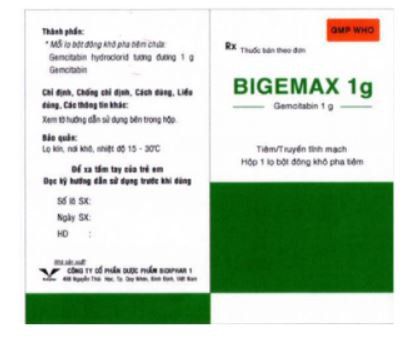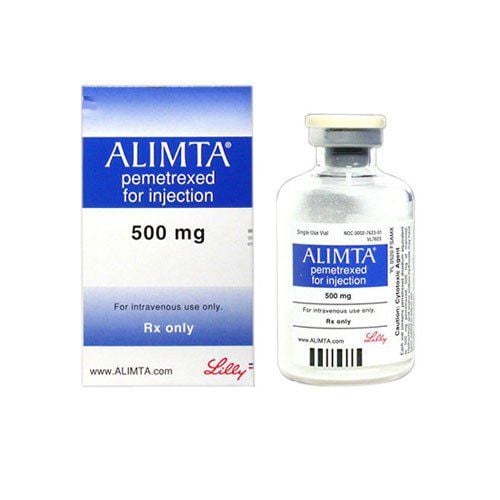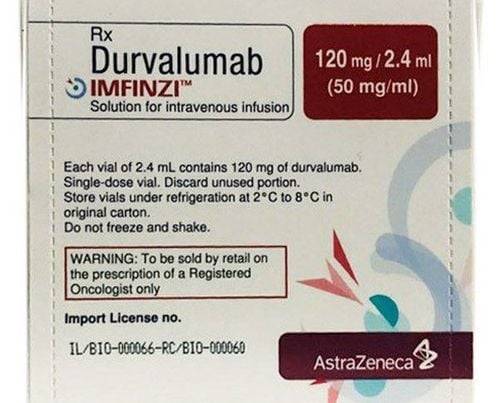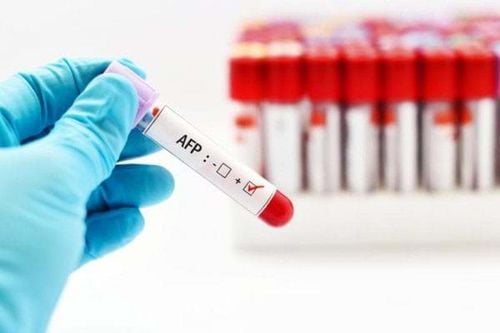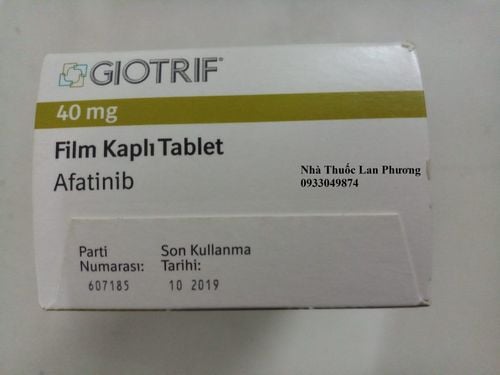This is an automatically translated article.
Carbosin belongs to the group of drugs that fight cancer and strengthen the immune system. Carbosin is administered intravenously. To understand the dosage of the drug to limit side effects, please refer to the content below.
1. What is Carbosin?
Carbosin is a product made directly by Pharmachemie BV. - Made in the Netherlands with registration number VN-13628-11. The main ingredient of the drug is Carboplatin with a concentration of 10mg/ml to support the treatment of ovarian cancer, testicular cancer, lung cancer,...
Carbosin is prepared in the form of a concentrated solution for infusion, Packed in a box of 1 bottle of 15ml. Carbosin medicine should be stored at 2 - 8°C, not frozen or in direct sunlight.
2. What are the effects of Carbosin?
Carbosin is indicated for the following subjects:
Patients with ovarian cancer from early to late stages, recurrence, metastasis after treatment; The patient has cancer in the neck and head; Patients with lung cancer (both small cell and non-small cell); Patients with testicular cancer; Patients with bladder cancer; Patient has brain tumor, Wilms tumor, neuroblastoma, retinoblastoma.
3. Contraindications of Carbosin
Carbosin drug is contraindicated for the following subjects:
Patients with hypersensitivity or allergy to any ingredient of Carbosin drug. Patients are pregnant and lactating women. The patient has severe myelosuppression. The patient has severe renal failure. The patient has a bleeding tumor.
4. Dosage – how to use Carbosin
To use Carbosin drug to promote the most effective, patients need to know how to use and the dosage of the drug.
4.1. How to take Carbosin Carbosin is given intravenously over 15 minutes or longer. Continuous transmission for 24 hours is possible. Note: Carbosin is not antibacterial. To reduce the risk of infection, the infusion should be completed for up to 24 hours, after which the excess should be discarded. Carbosin can be diluted with 0.9% NaCl solution or 5% Dextrose solution. Caution when mixing the drug: Absolutely do not let Carbosin dirty on the skin and the medicine splashed into the eyes can lead to blindness. Inject Carbosin into a blood vessel. Extravascular injection can lead to necrosis. 4.2. Carbosin Dosage The starting dose of Carbosin is based on body surface area, usually 300-450mg/m2. Or according to the formula: Total dose (mg) = target AUC (mg/ml/min) x Cl carboplatin (ml/min). The total dose can be as high as 1,600mg/m2 divided over several days. Repeat dose after at least 4 weeks. For ovarian cancer: The starting dose in adults is 300mg/m2. The next dose should be after 4 weeks or so if the toxicity in the blood recovers slowly. The total course of treatment is about 6 times. For recurrent ovarian cancer: Initial dose is 360mg/m2. The next dose should be after 4 weeks or so if the toxicity in the blood recovers slowly. Carbosin dose for patients with renal impairment: In case of creatinine clearance less than 60 ml/min, the dose should be reduced. In case the creatinine clearance is 41 - 59 ml/min, the starting dose is 250 mg/m2. In case of creatinine clearance 16-40ml/min, the starting dose is 200mg/m2.
5. Overdose handling – missed dose of Carbosin
Carbosin missed dose: Belongs to the group of drugs that support cancer treatment by intravenous infusion with doses used very far apart. Therefore, it is very unlikely that a missed dose will occur.
Carbosin overdose: The body appears many toxic symptoms, the most severe is marrow failure, hepatotoxicity, nephrotoxicity, hearing, neurological, and digestive toxicity. When an overdose is known, stop taking the drug and notify the doctor for timely emergency.
6. Side effects of Carbosin
Properly used, effective use of Carbosin. On the contrary, using the wrong dose, wrong way of administration, patients face unpredictable side effects:
Common side effects:
For blood: Bone marrow failure, thrombocytopenia/leukopenia, severe anemia . For the digestive system: Patients with vomiting, nausea, diarrhea, abdominal pain, peptic ulcer, constipation. For the nervous system: Muscle weakness, myoclonus, paresthesia of extremities, cramps, convulsions, loss of taste. Peripheral neurotoxicity, central nervous system toxicity, human pain, body weakness,... For ears: Tinnitus, hearing loss. For kidney: Increase blood creatinine. For the liver: Increased AST, alkaline phosphatase,... Electrolyte loss: Decreased blood potassium, blood sodium,... Cardiovascular side effects: Patients with thrombosis, heart failure, cerebrovascular disease. For urinary and genitourinary systems: Tubular degeneration or necrosis, interstitial edema. Allergies: Urticaria, skin rash, itching,... Injection site: Swelling, pain, redness, if injected outside the vessel, it will be necrotic. Few and rare side effects:
For the heart: Severe toxicity can be fatal. Systemic side effects: Hypotension, anaphylaxis. For the respiratory system: The patient has bronchospasm. Eye side effects: Vision is reduced to varying degrees. Note: The above are side effects when using Carbosin alone. If combined with other drugs, the degree of side effects is higher.
7. Carbosin drug interactions
When using 2 or more different drugs at the same time, it is easy to interact, especially Carbosin cancer drug.
Carbosin alone has caused many side effects. If combined with other drugs, the degree of bone marrow depression is more severe. If radiation therapy increases the toxicity on the blood. If Carbosin is combined with Cyclophosphamide, there will be increased toxicity on blood, nerves, digestion, vision and hearing. Carbosin itself is toxic to the kidneys, but only at a mild to moderate level. If combined with Aminoglycoside drugs, it will strongly increase the toxicity on kidney and hearing. If Carbosin is combined with drugs that have toxic effects on hearing such as Furosemide, Ifosfamide,... the risk of deafness is very high. If Carbosin is combined with other drugs that cause vomiting, vomiting will increase. If Carbosin is combined with Warfarin, it can cause bleeding. reduce the effect of Phenytoin when combined with Carbosin.
8. Notes when using Carbosin
Carbosin is a very toxic drug with a low therapeutic index. Response to treatment occurs only when the body shows signs of toxicity. Therefore, the use of Carbosin drug requires close monitoring of the doctor/pharmacist and preparation of means to handle complications if anaphylaxis occurs. When using Carbosin, weekly hematology tests are required because the risk of marrow failure is very high. A decrease in white blood cells causes infection, and a decrease in platelets that causes bleeding. Closely monitor renal function, if severe renal failure should not use Carbosin. For elderly patients, specifically over 65 years old, using Carbosin will cause neurotoxicity, myelosuppression, renal failure, peripheral neuropathy. Pregnant women, especially in the first 3 months, using Carbosin will cause side effects: Miscarriage, teratogens, fetal malformations,... Therefore, absolutely do not use Carbosin drugs with subjects. this. In case of mandatory drug use, there should be supervision and supervision from a doctor/pharmacist. Carbosin is passed on to the baby through breast milk. Therefore, this group of subjects should not use the drug. The article has fully synthesized the use of Carbosin and has not identified all the accompanying side effects. Therefore, patients should carefully read the instruction leaflet before taking the drug, and consult a specialist doctor/pharmacist. Note, Carbosin is a prescription drug, patients need to use it according to the doctor's prescription, absolutely not self-treatment at home.




